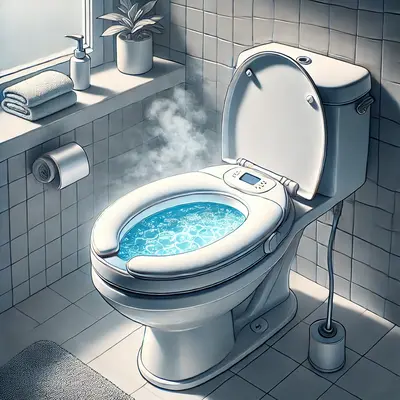Pain near the anus can be an uncomfortable and worrying experience, but it’s more common than you might think. Many individuals suffer from rectal pain at some point in their lives. It can vary in intensity, come and go, and range from mild discomfort to severe pain. In this guide, we’ll explore common causes, symptoms, and treatment options for pain near the anus, as well as offer practical advice for managing this often-stigmatized condition.
Common Causes of Pain Near the Anus
Pain near the anus can be caused by a variety of conditions, each with its own set of symptoms and treatment options. Below are some of the most common reasons for anal discomfort.
1. Hemorrhoids
Hemorrhoids are swollen blood vessels in the rectal area, often caused by straining during bowel movements, pregnancy, or chronic constipation. This condition can result in a sharp pain near the anus, itching, and bright red blood during bowel movements.
- Symptoms: Swelling, itching, bleeding during bowel movements.
- Treatment: Over-the-counter creams, sitz baths, and dietary changes can help relieve symptoms.
“Studies show that about 75% of adults will experience hemorrhoids at some point in their lives.” – American Society of Colon and Rectal Surgeons
2. Anal Fissures
An anal fissure is a small tear in the lining of the anus, typically caused by passing hard or large stools. The pain can be intense and is usually accompanied by a burning sensation during and after bowel movements.
- Symptoms: Sharp pain, visible tear, bleeding.
- Treatment: Increasing fiber intake, stool softeners, and topical anesthetics are often effective.
3. Abscesses and Fistulas
An abscess is a painful, pus-filled infection near the anus, while a fistula is a tunnel that connects an abscess to the skin. Both conditions can cause significant pain, swelling, and fever.
- Symptoms: Swelling, redness, fever, pus drainage.
- Treatment: Medical intervention, including drainage and antibiotics, is typically required.
“Anal abscesses are not uncommon and can affect both men and women equally, with quick treatment being essential.” – National Institute of Diabetes and Digestive and Kidney Diseases
4. Proctalgia Fugax
Proctalgia fugax is a sudden, severe rectal pain that usually lasts for a few minutes. It can occur unpredictably and is thought to be caused by muscle spasms in the pelvic floor.
- Symptoms: Sudden, sharp pain that may last a few seconds to several minutes.
- Treatment: Relaxation techniques and warm baths may provide relief.
Lifestyle Factors Contributing to Pain Near the Anus
While some causes of rectal pain are medical conditions that need intervention, lifestyle factors can also play a role.
1. Poor Diet and Constipation
A diet low in fiber can lead to constipation, which increases the likelihood of straining during bowel movements. This straining can contribute to conditions like hemorrhoids and anal fissures.
- Solution: A fiber-rich diet that includes vegetables, fruits, and whole grains can help soften stools and ease bowel movements.
“Fiber intake of at least 25 grams per day for women and 38 grams for men is recommended to maintain healthy digestion.” – Mayo Clinic
2. Sedentary Lifestyle
Sitting for extended periods can contribute to the development of hemorrhoids and increase discomfort in the anal region. Staying active can help improve circulation and reduce pressure in this area.
- Solution: Regular exercise, even a 20-minute walk each day, can help relieve anal pain by promoting better circulation.
Treatment and Management
The treatment for pain near the anus largely depends on the underlying cause. Here are some general treatment strategies:
1. Over-the-Counter Medications
Anti-inflammatory creams, hydrocortisone suppositories, and pain relievers like ibuprofen can provide temporary relief for pain and itching.
2. Sitz Baths
A sitz bath can help reduce inflammation and pain by immersing the anal area in warm water. These are especially helpful for hemorrhoids and anal fissures.
3. Medical Procedures
For more severe conditions, such as large hemorrhoids or abscesses, medical procedures may be necessary. Hemorrhoidectomy, drainage, and other surgical options can provide lasting relief.
Prevention Tips for Anal Pain
Prevention can go a long way in reducing the likelihood of experiencing pain near the anus. Here are some practical steps to consider:
- Eat a Fiber-Rich Diet: Incorporate high-fiber foods to promote healthy digestion and prevent constipation.
- Stay Hydrated: Drink plenty of water throughout the day to help keep stools soft.
- Maintain Good Hygiene: Keeping the anal area clean and dry can prevent irritation and infections.
- Avoid Straining: Try not to strain during bowel movements, as this can exacerbate conditions like hemorrhoids and fissures.
Case Studies: Personal Stories of Recovery
Case 1: Maria’s Hemorrhoid Relief
Maria, a 34-year-old mother of two, started experiencing hemorrhoids after her second pregnancy. By incorporating more fiber into her diet and using over-the-counter creams, Maria was able to manage her symptoms and avoid surgery.
Case 2: David’s Experience with Anal Fissures
David, a 45-year-old office worker, dealt with chronic constipation and developed an anal fissure. After increasing his water intake and using topical anesthetics, he experienced significant relief.
Table: Common Causes of Pain Near the Anus and Their Treatments
| Cause | Symptoms | Treatment Options |
|---|---|---|
| Hemorrhoids | Swelling, bleeding, itching | Creams, sitz baths, dietary changes |
| Anal Fissures | Sharp pain, visible tear | Fiber, stool softeners, topical anesthetics |
| Abscesses & Fistulas | Swelling, fever, pus | Drainage, antibiotics |
| Proctalgia Fugax | Sudden, sharp pain | Warm baths, relaxation techniques |
Conclusion
Pain near the anus can be distressing, but it’s often manageable with proper understanding and treatment. By identifying the underlying cause, making lifestyle adjustments, and seeking medical advice when necessary, you can reduce symptoms and prevent recurrence. Remember, you’re not alone, and there’s no need to suffer in silence. If the pain persists or worsens, consult a healthcare professional for personalized advice.









